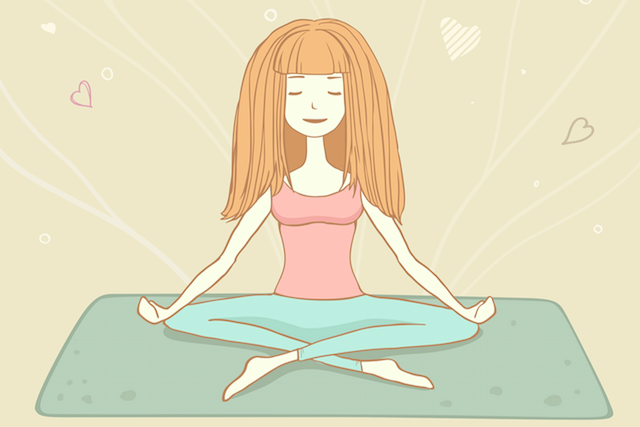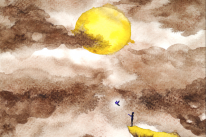
Stress can be overwhelming, and sometimes crippling.
Not only does stress suck the joy out of our days and keep us awake at night, it can also take a toll on our bodies.
Headaches, chest pain, digestive problems, hair loss—they’re all potential consequences of stress, not to mention serious conditions like heart disease and diabetes.
Then, of course, there are mental consequences. We feel anxious, restless, and irritable, and often scared and discouraged. Like there’s too much to do and we don’t have enough time or skills to do it.
Everything feels urgent, like life is a series of catastrophes to sidestep and fires to put out. It’s an exhausting way to live.
At least, it was for me.
And I knew I was creating a lot of problems for myself—that my stress stemmed not from my circumstances but rather how I chose to respond to them. Life felt like a ticking time bomb, but I was both the bomb squad and the madman holding the detonator.
To cope with this chronic tension, we often turn to quick fixes that actually create more problems than solutions. We shove it down with food, or spew it out with angry outbursts, or numb it with drugs and alcohol.
But it’s still there, bubbling below the surface, just waiting to erupt.
Life is always going to involve situations that we find stressful. We’ll lose jobs, loved ones, and eventually, our health. People will cross our boundaries, push our buttons, and leave us high and dry when we need them.
There will never be a time when life feels simple or easy.
We can choose to live in constant fight-or-flight mode, as if life is a string of crises; we can turn to Band-Aid behaviors to temporarily dull the pain; or we can take responsibility for learning a better way.
What is that better way? Mindfulness.
Mindfulness means maintaining a moment-by-moment awareness of our thoughts, feelings, bodily sensations, and our surrounding environment.
When we’re practicing mindfulness, we’re rooted in the present moment—not dwelling on the past or worrying about the future.
As a result, we’re able to reduce our own suffering and bring more joy and compassion to both ourselves and others.
To say that mindfulness has changed my life would be a massive understatement.
There was a time when I felt powerless to my overactive mind, and worse, I had no idea I was causing myself pain. I thought my response to adversity was the only possible one. I thought I had to be outraged, depressed, and anxious.
I still feel those feelings at times, but I now know how to observe them, learn from them, and release them so that they don’t consume me.
You can do the same, and I know just the course to get you started.
A while back, I connected with someone at Udemy, a site that currently serves over 11 million students through more than 40,000 online courses.
They introduced me to a number of courses that might interest Tiny Buddha readers, including one entitled Mindfulness Practice for Joy & Compassion by Thich Nhat Hanh
This master Buddhist monk teaches students how to release suffering and heal the body through mindfulness techniques like walking meditation and breathing meditation.
Thích Nhất Hạnh is a Zen master, scholar, poet, and peace activist. He’s written over sixty books and was nominated for the 1967 Nobel Peace Prize by Martin Luther King, Jr.
Hahn’s course will help you learn to:
- Embrace suffering and move through it
- Ease anxiety and relieve tension about the future
- Use suffering to generate love and compassion
- Avoid sickness with mindful consumption
You will walk away from this course knowing how to meditate, reflect, transform, and make a positive impact on your environment.
As you may have gathered through reading the site, I am highly selective with what I choose to promote here. I pride myself on only sharing products, books, and courses I would personally recommend, and this program certainly fits that criteria.
All you need for this course is a computer or mobile device with an Internet connection. You don’t need any prior knowledge of Buddhism or meditation.
And as a bonus, Udemy has offered a 30% discount for Tiny Buddha readers, bringing the cost from $50 down to $35 (from now until July 1st).
If you’re tired of feeling mentally exhausted, Thich Nhat Hanh’s course may be just what you need to find peace. You can learn more about Mindfulness Practice for Joy & Compassion by Thich Nhat Hanh here.
—
Continue your quest for knowledge with Udemy. Udemy offers thousands of courses on all kinds of topics, from business to writing to software engineering.
Disclosure: This post contains affiliate links, which means I earn a percentage of all sales. Posts like these help support the site and keep it going.
About Lori Deschene
Lori Deschene is the founder of Tiny Buddha. She started the site after struggling with depression, bulimia, c-PTSD, and toxic shame so she could recycle her former pain into something useful and inspire others to do the same. You can find her books, including Tiny Buddha’s Gratitude Journal and Tiny Buddha’s Worry Journal, here and learn more about her eCourse, Recreate Your Life Story, if you’re ready to transform your life and become the person you want to be.
- Web |
- More Posts












 Though I run this site, it is not mine. It's ours. It's not about me. It's about us. Your stories and your wisdom are just as meaningful as mine.
Though I run this site, it is not mine. It's ours. It's not about me. It's about us. Your stories and your wisdom are just as meaningful as mine.
I can completely get where you’re coming from Lori. The first few lines of your article really resonate with me. Like you, I find ways to cope but, personally, I don’t think I’ll ever be completely ‘cured’! Life has an odd way of reminding you every now and then that it will never be easy. Mind you there’s no harm in that. Looked at positively, this keeps you on your toes and ensures you’re active (seems to be the case for me anyway). Mindfulness is a great way of coping. I find the main challenge tends to be having the self-discipline to set aside the time to do it. Prioritisation seems for me to be a never ending challenge. This often tends to be the challenge that faces those I coach self-confidence too. Thanks so much for an enlightening post. Mike
I hear you, Mike! That’s a great way to look at it. I love integrating mindfulness into my everyday life – whether it’s mindful eating or mindful walking – because then I don’t have to set aside a special time for it. Coloring has also been a wonderful mindfulness practice for me. =)
The udemy link goes to a course called “Awakening a Joyful Heart with Meditation by Jack Kornfield”
Thanks so much for pointing this out, Les! I’ve updated the link.
Hi Lori great post, I have read a couple of books by the wonderful Thich Nhat Hanh and was really excited to see that he has made an ecourse on Udemy, so skipped straight over to the link you kindly provided but unfortunately it seems the link is incorrect as noted by Les Roy, further this course by Jack seems to stop before the end of the course, please could you provide the correct link as anyone reading your post will have been drawn here by reading Thich Nhat Hanh’s name and will be disappointed to find a different course. With love and kindness, Stephen
Sorry about that, Stephen! It’s fixed now. =)